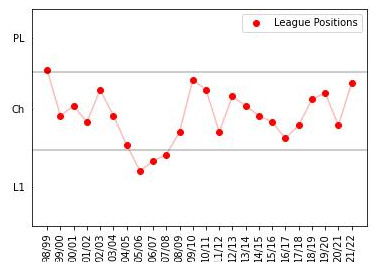Nottingham Forest: A new blueprint for Premier League survival?
Nottingham Forest won 1-0 at home to Arsenal on Saturday to clinch Premier League safety. This represents a great first season back in England’s top flight.
Forest have been an interesting team to follow this season. Their approach seems different to that followed by many other promoted teams. This has led some to ask whether they will become an example to other promoted sides in the coming seasons.
Nottingham Forest’s Recent History
Nottingham Forest were an established First Division side in the 1980s. Forest were founding members of the new Premier League in 1992. However, they would soon become something of a yo-yo team in the new Premier League. Forest finished in the relegation zone in 1992/93 and 1996/97, each time spending one season in the Football League.
When the team faced relegation again in 1998/99, they may have expected to return quickly once more. Instead, however, they would face a long wait to return.
All in all, it took 23 years for Forest to return to the top flight. Most of that time was spent in England’s second tier. However, they even had a three-year spell in League One in the early 2000s:
Late Promotion
Nottingham Forest won the Playoff Final 1-0 over Huddersfield on 29th May 2022 to seal their return to the Premier League.
The two clubs promoted automatically from the Championship have time to plan their summer. The club promoted by winning the Playoffs faces a more difficult challenge. They have to do their summer business in a shorter window. Until they win the Final at Wembley, they must have contingency plans for both promotion and for remaining in the Championship.
This challenge was exacerbated for Forest in the 2022/23 pre-season because the season was due to begin earlier than usual. With the World Cup in Qatar set to interrupt the season, the Premier League would kick off on the weekend of the 6th August. The sense of urgency was great and Forest needed to spring quickly into action.
Active in the Market
Forest’s activity in the transfer market surprised many observers. The club was more active than any club has been in Premier League history:
Nottingham Forest set a new Premier League record by signing 21 players this summer 🥴
— GOAL (@goal) Sep 2, 2022
After that tweet, Forest signed Serge Aurier on a free transfer, extending their own record to 22 arrivals in a single transfer window.
Come the January window, Forest would again be active in the transfer market. They made seven further signings in a busy mid-season window.
This approach is radically different to that taken by many other promoted teams in recent years. Eddie Howe’s Bournemouth and Sean Dyche’s Burnley both broke into the Premier League and stayed there for multiple seasons using a core of players that got them promoted. Brighton, themselves becoming something of a model club in recent years, made 11 signings during their whole first season in the Premier League, including five loans and two free transfers.
Backing the Manager
Nottingham Forest’s manager Steve Cooper hasn’t just been backed in the transfer market, however. Both fans of the club and the ownership have publicly backed the Welshman.
Twice during the season, the club was struggling for form on the pitch and there was intense media speculation about Cooper’s position. But he was publically backed even after losing five games in a row in October. Owner Evangelos Marinakis has had confidence in Cooper throughout. He hasn’t rushed into a decision after a bad run of form as Crystal Palace did in sacking Patrick Vieira.
Interestingly, Marinakis seems to have been less patient with some of the club’s other front office staff. Former Watford sporting director Filippo Girardi was brought in to the club in October. Girardi and Marinakis conducted a review of the summer business that resulted in head of recruitment George Syrianos and head of scouting Andy Scott both losing their jobs. However, Girardi himself then lasted just six months in the role before being sacked in April and replaced by Rangers sporting director Ross Wilson.
Forest’s Context
This all looks rather chaotic from the outside and it’s important to understand the context around Nottingham Forest. This allows us to understand why some of these things have happened. In turn, we can understand what lessons other clubs can learn from the club’s first season back in the Premier League.
Many Departures
Forest gained something of an unexpected promotion to the Premier League. At the time of the playoff final, their team was built around a number of loan signings. They also had a large number of players with expiring contracts. As a result, they expected to be busy in the transfer market whichever league they ended up in.
The club needed to add Premier League quality but also needed quantity in terms of squad numbers. They were successful in both regards: whilst they did break the record for the number of signings, their total transfer outlay was not as crazy as many reported.
Salary Flexibility
Too many outlets report clubs’ net spend figures in this sort of style:
Newcastle have the highest net spend in the Premier League since January 📊
— Sky Sports Premier League (@SkySportsPL) Aug 30, 2022
This isn’t a particularly useful style of reporting because it’s out of touch with how clubs actually operate. The accounts of football clubs record players as assets on the balance sheet, and amortise them over the length of the player’s contract. We have seen this well-demonstrated by Chelsea’s approach this season. The Londers have made many big-money signings, but have done so on long-term contracts. Overall, the reality of club finances does not match the most common reporting in the media.
The salaries of players are also a huge element of their affordability, and with such a small squad going into the summer window Forest had a lot of flexibility to make additions. Where some other clubs could probably have afforded the transfer fees paid by Forest, they didn’t have room within their wage budgets to make the same scale of additions.
Cooper’s Popularity
Sticking with Steve Cooper through the season has made sense. He’s a young manager who has shown lots of promise. The club has also shown him loyalty for getting them back to the Premier League. The most important factor, however, is that Cooper has the support of the club’s fans. With the fans and team pushing in the same direction, they’ve been able to secure their safety. Owners in a relegation battle often feel pressure to make a change. They can feel pressure to do something to try and influence results, and also to deflect criticism from themselves. This hasn’t been a factor for Forest this season and they’ve been stronger for it.
What are the lessons?
The lessons from Forest’s seasons therefore aren’t necessarily that clubs should now always spend big or bring in lots of players on promotion. Rather, the context must dictate the approach. Newly-promoted clubs may not be in the same situation as Nottingham Forest this season.
I would say that clubs should learn two main lessons from Forest this year.
Build and Utilise Unity
Firstly, clubs should try to leverage the positivity that comes with promotion. There’s usually a feel-good factor in the dressing room, and goodwill for the manager in the stands.
Burnley, promoted back to the Premier League for next season, seem especially to be in a this situation going into 2023/24. Vincent Kompany is one of the rising names in the world of management and enjoys great popularity with fans.
Too many clubs make rash changes when they face a bad run of results – whilst Palace got away with getting rid of Vieira this year, the jury is out on the long-term consequences of that decision. Burnley should stick with Kompany even if they have a few difficult periods next season.
Scout Well
The second lesson is going to be harder to replicate, but it’s to successfully identify transfer targets at a variety of levels, price points, and situations to allow the club to take advantage of a surprisingly good season on the pitch.
It seems Forest themselves still aren’t fully happy in this area, as shown by their late-season change in sporting director. However, they did manage to make a success of their busy transfer window this summer – not only did they find the quantity needed, but also the quality, with Morgan Gibbs-White touted as one of the signings of the season:
Here’s @Carra23 and @GNev’s picks for Signing of the season ✍️
— Sky Sports Premier League (@SkySportsPL) May 22, 2023
This Year’s Playoff Final
Luton Town and Coventry City meet in the Playoff Final this weekend. Fans of the winning team should definitely be ready for exciting times. However, I wouldn’t expect them to make 21 summer signings just because Forest did so and stayed up. Every club’s context is different.
